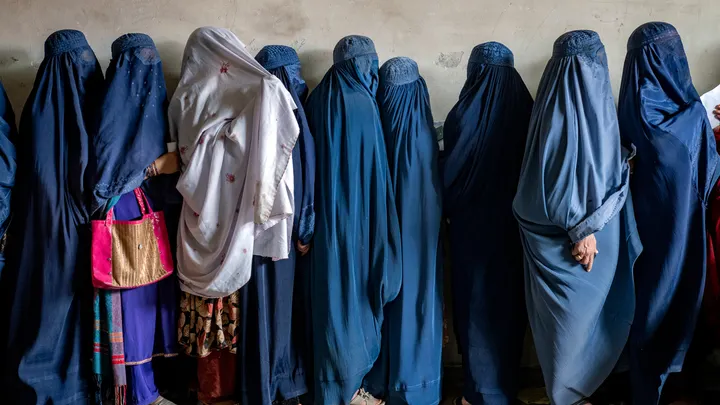The Taliban’s recent enforcement of new ‘vice and virtue’ laws has drawn sharp criticism from the United Nations, focusing on the prohibition of Afghan women from revealing their faces or speaking in public. These regulations, which have sparked international outcry, reflect the Taliban’s strict interpretation of Islamic Sharia law, underscoring a rigid stance on women’s rights.
UN Criticizes Restrictions on Women’s Rights
Roza Otunbayeva, head of the U.N. mission in Afghanistan (UNAMA), voiced strong disapproval of the new laws, which she believes present a “distressing vision” for the nation’s future. According to Otunbayeva, these regulations extend the “already intolerable restrictions” on Afghan women and girls, making “even the sound of a female voice” in public a moral offense. Her statement highlighted the growing concern over the impact these laws could have on women’s freedom and participation in society.
Taliban’s Justification and Response
Zabihullah Mujahid, the Taliban’s main spokesman, dismissed the UN’s concerns as rooted in a lack of understanding of Islamic principles. “We urge a thorough understanding of these laws and a respectful acknowledgment of Islamic values. To reject these laws without such understanding is, in our view, an expression of arrogance,” Mujahid asserted. His statement emphasized the Taliban’s view that these measures are necessary to uphold Islamic Sharia law, suggesting that criticism from non-Muslim entities may be misguided or uninformed.
New ‘Vice and Virtue’ Laws Explained
The newly implemented laws, described as Afghanistan’s first set of regulations aimed at promoting virtue and preventing vice, require women to fully conceal their faces, bodies, and voices when outside their homes. Additionally, the laws ban images of living beings, such as photographs, further restricting personal freedoms. These regulations signify a return to the strict social codes that characterized the Taliban’s previous rule in the 1990s, raising concerns about the erosion of civil liberties, especially for women.
The Humanitarian Perspective
Otunbayeva criticized the new regulations, emphasizing the suffering of the Afghan people. She stated, “After decades of war and in the midst of a terrible humanitarian crisis, the Afghan people deserve much better than being threatened or jailed if they happen to be late for prayers, glance at a member of the opposite sex who is not a family member, or possess a photo of a loved one.” Her remarks highlight the broader humanitarian crisis, suggesting that the enforcement of these laws could worsen the already dire situation.
Firm Stance of the Taliban
In response to ongoing international criticism, Mujahid reiterated the Taliban’s firm commitment to enforcing their interpretation of Islamic law. “We must stress that the concerns raised by various parties will not sway the Islamic Emirate from its commitment to upholding and enforcing Islamic Sharia law,” he declared. This statement underscores the Taliban’s determination to proceed with their agenda, despite international objections.
A Divided Outlook on Afghanistan’s Future
The introduction of these restrictive laws highlights the deep divide between the Taliban’s vision for Afghanistan and the international community’s hopes for the country’s future. As the Taliban solidify their control, the prospects for women’s rights and personal freedoms in Afghanistan appear increasingly uncertain. The global response will be crucial in shaping how these issues are addressed moving forward.







